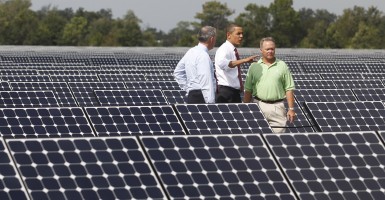As the lame-duck Congress limps to the finish line, billions of dollars in federal energy subsidies could be up for grabs.
The perennial procrastination has solar and wind-power lobbyists scrambling for tax credits. Last week, lawmakers reached a deal on a $440 billion tax package only to have President Obama threaten a veto. The package would have resuscitated the wind tax credit that expired last year.
Some lawmakers are still hoping to keep the subsidies flowing via “tax extenders,” says Matt Mitchell, a policy analyst at George Mason University’s Mercatus Center.
Mitchell says the legislative stall is by design.
“It’s not an accident,” he said. “Granting temporary privileges or punishment allows Congress to fund-raise on them over and over again.”
Sen. Charles Grassley, R-Iowa, recently chided his congressional colleagues for delaying action, declaring, “This is no way to do business.“
Grassley helped enact the wind tax credit in the early 1990s, with a prediction that the federal subsidies would be only short-term.
“Here we are, more than 20 years later,” Mitchell noted. “Can we really say they’re temporary?”
The International Energy Research reports widening disparities in government subsidies granted to producers. According to the group:
- Oil receives 64 cents in federal tax credits per energy unit produced.
- Other fossil fuels receive 82 cents.
- Nuclear power receives $3.14.
- Wind power gets $56.
- Solar power rakes in $775.
Renewable energy credits survive with bipartisan backing. Outgoing Democratic Senate Majority Leader Harry Reid, for example, has a personal and political stake in giant solar farms in his home state of Nevada.
Sean Lansing, director of the Virginia branch of Americans for Prosperity, took aim at the wind industry.
“It’s time for Congress to stop using taxpayer money as handouts for Congress’ friends,” he said. “The American people cannot afford their tax dollars being redistributed to subsidize an industry whose economic benefits have consistently fallen short of expectations.”




























